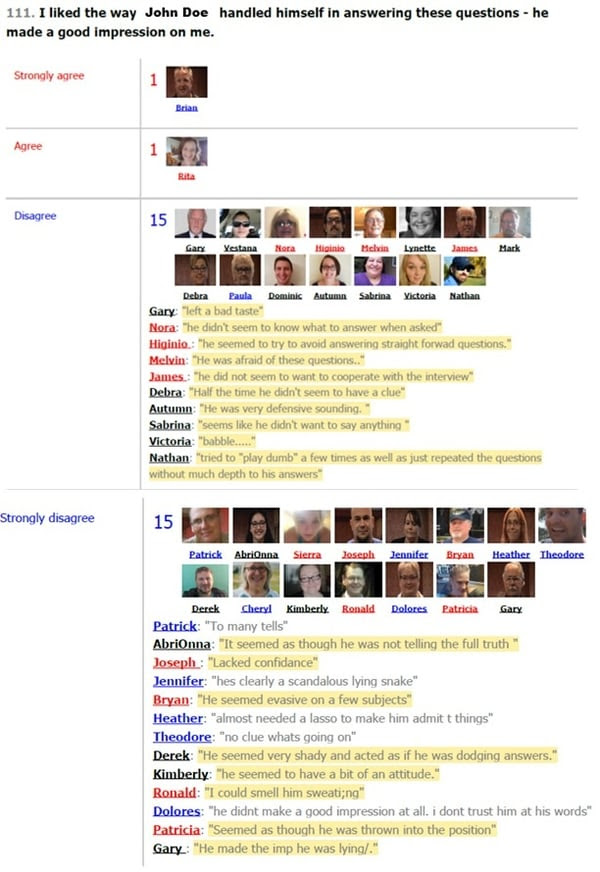How Good People Go Ugly When Testifying
I’ve recently seen clients struggle with bad depositions by good witnesses, so I want to share a few insights with you on ways we have found to improve your outcomes in this critical element of your case.
I imagine you have been in this situation: Your key witness is a good man. You know he is honest. In all your discussions he is down-to-earth. Likeable. Not a whiff of arrogance.
Then comes the deposition. And the video camera. And a hostile lawyer asking tough questions. What happens? Your likable Joe Sixpack disappears… replaced by an arrogant jerk. Someone you have never seen before. It can happen to the best people.
Before you know it, your star witness is earning feedback from jurors similar to these results from a Private Jury Trial we completed last month:

Many factors can cause this unwelcome transformation. The most common, of course, is fear. Specifically, fear of difficult questions. For defendants these difficult questions tend to come on liability; for plaintiffs, they tend to come on damages. This version of ugly can lock you and your client into foolish positions. It can be very costly. Here are some suggestions:
- Avoid Untenable Positions Most of the witnesses you call want to help the team. They want to say the right thing. And so in your informal discussions, they will agree to whatever position the team takes, even if they don’t actually agree with it. “No, we didn’t do anything wrong. We could easily have prevented this tragedy, but we didn’t do anything wrong.” Dumb themes and dumb positions make your witnesses look and feel dumb. Don’t ask them to defend the Indefensible. Don’t put them in a position where they inevitably will look stupid.
- Ask the Hard Questions You want to go way overboard, asking really tough questions of your witness as you prep. This builds confidence. The deposition will then feel like a relative cakewalk.
- Avoid Hesitation Timing delays do not show up on a written transcript. Many lawyers, therefore, advise their witnesses to stop and think before answering every question. This is sensible and works for the written transcript. But it produces extremely negative reactions on the video record. Encourage your witnesses to time their answers naturally. Not too fast. Not too slow.
- Explain Hesitations If your witness must hesitate, they should ask for a moment to think, or explain why they are hesitating. If the question is complicated or unclear, this will be acceptable to many jurors – they secretly feel sorry for anyone facing questions from a hostile lawyer.
- Show Them What They Look Like Take out your cell phone and make a quick video of your witness answering questions. Point out the good things, like smiling. And point out the things that could be improved.
- Show The Hardheaded What Mock Jurors Think of Their Testimony Finally, you can use an inexpensive service like First Court’s Prep4Dep to get feedback on your witness from disinterested lay people. This feedback typically comes in video form, so your witness can see and hear real people responding to the testimony. This is especially effective with witnesses who know everything or who do not want to take an upcoming deposition seriously.
Depositions and trials should help uncover the truth in our lawsuits. But the truth of a witness can be easily distorted by fear. The results can be disastrous. But anticipating the problem well ahead of the testimony, and considering the suggestions above, can help even the most nervous witness convey present more truthful testimony in your case when it matters the most.
I hope you will give me a call if you want to discuss how to help your witnesses give their best testimony. If there are others on your team who might appreciate this insight, here is the link to a blog post I recently wrote on this topic.
About The Author

Joe graduated from the U.S. Coast Guard Academy in 2011 with an officer’s commission and a B.S. in Management. He served tours of duty in San Francisco and New York, where he worked as a commercial shipping inspector and accident investigator. This work led Joe to work hand in hand with risk management and legal professionals, developing regulatory solutions to improve safety and business outcomes for the industry.
This experience building consensus between adverse parties inspired Joe to seek out opportunities as a peacemaker, leading him to resign from the Coast Guard and join First Court as a mediator and manager. Joe currently lives and works in the Denver metro area with his wife, daughter, and german shepard.


